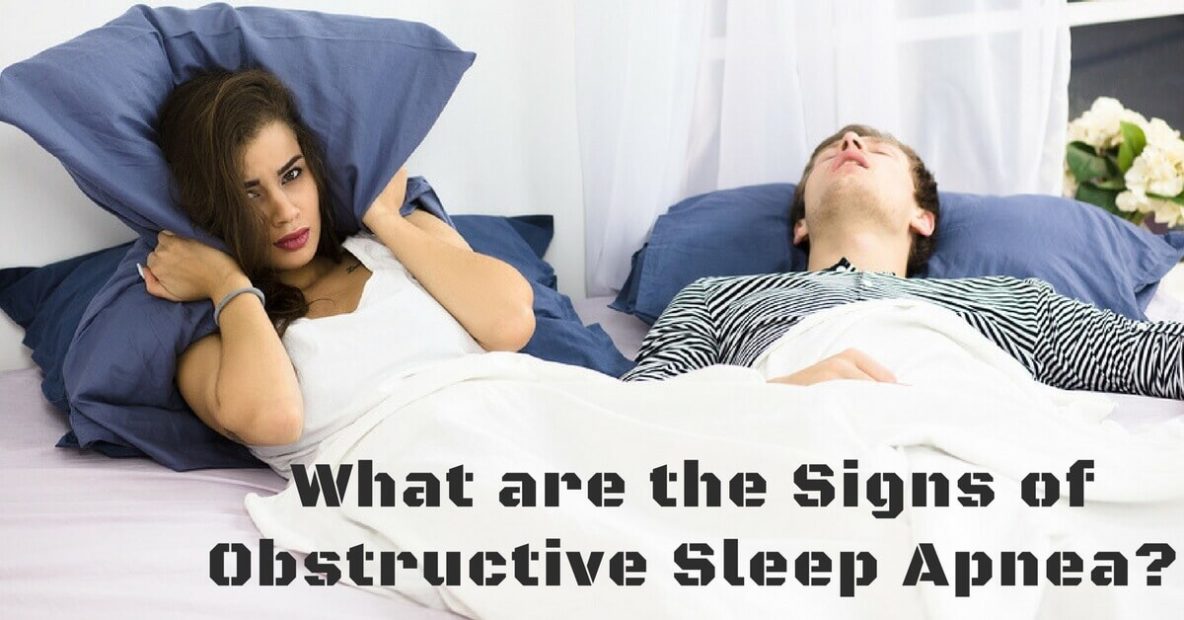What are the Signs of Obstructive Sleep Apnea?

- A Promising Paradigm Shift: New Research Challenges the CPAP-First Approach to OSA Treatment - September 5, 2023
- Understanding Sleep Meditation Techniques - July 30, 2021
- How Online Learning Has Affected Sleep for Students - July 13, 2021
Sleep is one of the most important things we can do to ensure our overall health and well-being. According to the National Sleep Foundation, “When we sleep well, we wake up feeling refreshed and alert for our daily activities. Sleep affects how we look, feel, and perform on a daily basis, and can have a major impact on our overall quality of life…Sleep helps us thrive by contributing to a healthy immune system, and can also balance our appetites, which play a role in our feelings of hunger and fullness. The one-third of our lives that we spend sleeping, far from being ‘unproductive,’ plays a direct role in how full, energetic, and successful the other two-thirds of our lives can be.”
Specialists recommend that adults get seven to eight hours of quality sleep. With obstructive sleep apnea, people do not experience a good night’s sleep. This leads to a number of issues, according to the National Sleep Foundation: “If sleep is cut short, the body doesn’t have time to complete all of the phases needed for muscle repair, memory consolidation, and release of hormones regulating growth and appetite. Then we wake up less prepared to concentrate, make decisions, or fully engage in school and social activities.”
What happens with Obstructive Sleep Apnea?
Affecting more than 18 million American adults, obstructive sleep apnea is a condition in which “the upper passages of your airway close off, interrupting your breathing and depriving you of oxygen until you wake up and start breathing again.”
Because obstructive sleep apnea occurs while you are sleeping, it may be difficult for you to recognize the signs of the condition. There are some tell-tale signs while you are sleeping and when you are awake.
Signs of Obstructive Sleep Apnea While You are Sleeping
According to sleep specialists, there are two signs of obstructive sleep apnea while you are sleeping:
- Loud, persistent snoring
- Pauses in breathing, accompanied with gasping episodes when sleeping
It is important to keep in mind that while many people snore, they do not necessarily experience obstructive sleep apnea. On the other hand, most people who experience obstructive sleep apnea do snore. This is confirmed by Dr. Robert Owens of the Sleep Disorders Research Program at Brigham and Women’s Hospital in Boston. If you share a bed with a spouse or partner, and your snoring is loud enough to wake them, this could indicate a sleep disorder, possibly obstructive sleep apnea. Light snoring may not require the attention of a sleep specialist, but consistent, chronic loud snoring may warrant a visit.
The second symptom, pauses in breathing with episodes of gasping, is a good indicator of obstructive sleep apnea. With obstructive sleep apnea, the soft tissues in your throat collapse naturally, causing a blockage in the airway while you sleep. With obstructed oxygen, your brain wakes yourself up naturally, in order to breathe – and this is what causes those pauses in breathing and episodes of gasping.
As these signs occur when you are asleep, they are more easily observed if you have a bed partner. Chances are, your bed partner may have already told you about your sleep patterns! If you do not have a bed partner, and are curious whether you may have obstructive sleep apnea, take a quick sleep assessment on our website here.
Signs of Obstructive Sleep Apnea When You Are Awake
Have you ever woken up with a headache? Do you find yourself dozing off in the middle of the day, while you’re sitting at your desk at work? Do you feel excessively sleepy throughout the day? These are a few indicators of obstructive sleep apnea. The Epworth Sleepiness Scale (which can be found here) gives you an idea of how daytime sleepiness is measured. Dozing off in the middle of conversations or meals may be an indicator of obstructive sleep apnea. It may also indicate other sleep related disorders.
Another sign is waking up with a dry mouth and gummy front teeth. This is a residual effect of consistent gasping through the night and breathing through the mouth. Additionally, waking up frequently to urinate in the middle of the night may be an indicator of obstructive sleep apnea. Due to the effects on one’s cardiovascular system, obstructive sleep apnea affects a hormone that controls urine production, according to Dr. Vishesh Kapur at the Sleep Institute at the University of Washington in Seattle. With extreme sleep apnea, this could make someone get up frequently in the night to urinate.
Visit Us at Sound Sleep Medical
Obstructive sleep apnea could lead to a number of other serious medical issues. The best way to treat obstructive sleep apnea is to see a sleep specialist. Here at Sound Sleep Medical, we provide treatment with continuous positive airway pressure (CPAP) devices. To learn more about treatment and to begin the process to a good night’s sleep, visit us at Sound Sleep Medical today.
